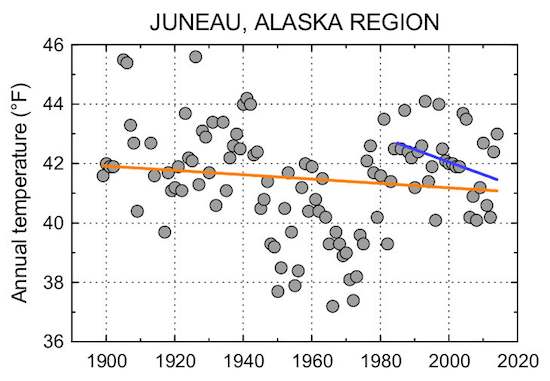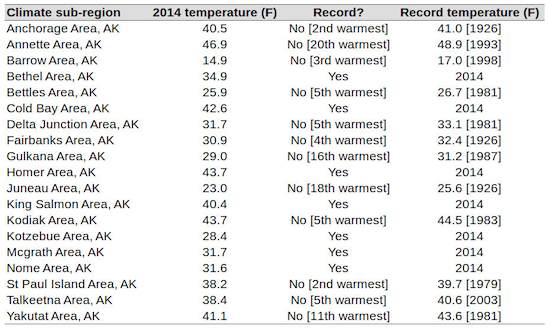By Sierra Rayne ——Bio and Archives--January 23, 2015
Global Warming-Energy-Environment | CFP Comments | Reader Friendly | Subscribe | Email Us
"The National Weather Service reports that 2014 was Alaska's warmest year on record. Even with record-breaking temperatures occurring all across the state, I see climate change getting framed as an 'Arctic' issue."The warmest year with record-breaking temperatures all across the state? That doesn't ring true. Here are the annual temperatures for the Juneau climate sub-region since records with the National Weather Service began in 1899.
 The orange line is a regression between 1899 and 2014. While it is non-significant, readers will note it has a negative slope (correlation) towards cooling -- not warming. Over the past 30 years (the blue line), there is nearly (p~0.09) statistically significant cooling trend for this region of southeastern Alaska.
At only 43.0°F, 2014 was nowhere near a record-breaking warm year for the Juneau area. That would be 45.6°F in 1926, followed by 45.5°F in 1905 and 45.4°F in 1906. Look at that massive warming trend from the 1910s up to the early 1940s. Imagine the fear of runaway catastrophic warming that residents of Juneau must have experienced over this time frame in the early 20th century.
Then the cooling trend from the early 1940s to the 1970s must have portended an imminent ice age ... until it warmed again from the late 1970s up to the 1990s ... and then another cooling trend started.
Some might think there were climate cycles at play in this pattern since the 1800s? But to suggest that simplistic observation would just be "climate denial."
The Anchorage region also didn't see a record-breaking warm year during 2014. That was set back in 1926 at 41.0°F, a full half-degree above 2014's temperature. Nowhere close to a significant warming trend over the last three decades, either.
The Gulkana region's record warm year was in 1987 at 31.2°F, whereas 2014 was only the 16th warmest at 29.0°F.
It was the warmest year on record in the Homer region, but certainly not in the Talkeetna area -- where 2014's temperature was 2.1°F below the record warm year of 2003.
Here is a table of the relative rankings of 2014's temperature across Alaska's climate sub-regions:
The orange line is a regression between 1899 and 2014. While it is non-significant, readers will note it has a negative slope (correlation) towards cooling -- not warming. Over the past 30 years (the blue line), there is nearly (p~0.09) statistically significant cooling trend for this region of southeastern Alaska.
At only 43.0°F, 2014 was nowhere near a record-breaking warm year for the Juneau area. That would be 45.6°F in 1926, followed by 45.5°F in 1905 and 45.4°F in 1906. Look at that massive warming trend from the 1910s up to the early 1940s. Imagine the fear of runaway catastrophic warming that residents of Juneau must have experienced over this time frame in the early 20th century.
Then the cooling trend from the early 1940s to the 1970s must have portended an imminent ice age ... until it warmed again from the late 1970s up to the 1990s ... and then another cooling trend started.
Some might think there were climate cycles at play in this pattern since the 1800s? But to suggest that simplistic observation would just be "climate denial."
The Anchorage region also didn't see a record-breaking warm year during 2014. That was set back in 1926 at 41.0°F, a full half-degree above 2014's temperature. Nowhere close to a significant warming trend over the last three decades, either.
The Gulkana region's record warm year was in 1987 at 31.2°F, whereas 2014 was only the 16th warmest at 29.0°F.
It was the warmest year on record in the Homer region, but certainly not in the Talkeetna area -- where 2014's temperature was 2.1°F below the record warm year of 2003.
Here is a table of the relative rankings of 2014's temperature across Alaska's climate sub-regions:
 Only 7 of these 19 climate sub-regions experienced record warmth in 2014, far from the "record-breaking temperatures occurring all across the state" claimed in the Juneau Empire article. That also assumes that the claimed record temperatures of 2014 were actually records. As we have seen recently in Australia, faulty thermometers misleadingly suggesting record high temperatures appear to be a major problem in climate science.
Was 2014 a warmer than average year in Alaska? Certainly. Was it a record warm year for the state? That is hard to tell in light of the historical data and the inherent difficulty in determining a regional "average" temperature from some limited weather stations whose coverage may not be representative of the area they purport to cover. Is the state in a significant warming trend over the past few decades? Probably not. Actually, "on the balance of probabilities, the state appears to be cooling."
And this northern state most definitely did not have record warmth all across it in 2014.
Only 7 of these 19 climate sub-regions experienced record warmth in 2014, far from the "record-breaking temperatures occurring all across the state" claimed in the Juneau Empire article. That also assumes that the claimed record temperatures of 2014 were actually records. As we have seen recently in Australia, faulty thermometers misleadingly suggesting record high temperatures appear to be a major problem in climate science.
Was 2014 a warmer than average year in Alaska? Certainly. Was it a record warm year for the state? That is hard to tell in light of the historical data and the inherent difficulty in determining a regional "average" temperature from some limited weather stations whose coverage may not be representative of the area they purport to cover. Is the state in a significant warming trend over the past few decades? Probably not. Actually, "on the balance of probabilities, the state appears to be cooling."
And this northern state most definitely did not have record warmth all across it in 2014.View Comments
Sierra Rayne holds a Ph.D. in Chemistry and writes regularly on environment, energy, and national security topics. He can be found on Twitter at @srayne_ca